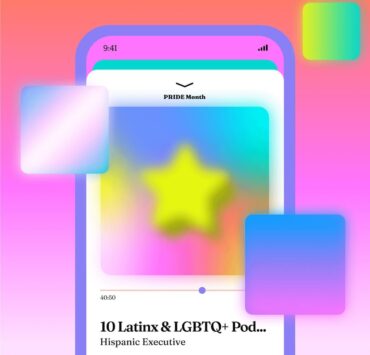|
Getting your Trinity Audio player ready...
|
The United States is in a time of reinvention. We are a nation on a journey reaching for a more perfect union as we refine and grasp the common good, and we are encountering many bumps along the way. As citizens of this beautiful country and participants in this grand experiment, we are responsible for improving our country and must be willing to change and reinvent ourselves.
As Hispanics and Latinos, it’s predicted that we will soon be the US majority so we not only have a unique responsibility to hold on to the aspects of our culture that bring value and impact, but also change what needs to change as we evolve as a nation.
Culture impacts every aspect of society, including business, education, family, and more, and provides purpose and meaning to our lives because it is foundational to leadership.
The only permanence is impermanence, or, in the words of Marcus Aurelius, “Everything’s destiny is to change, to be transformed, to perish. So that new things can be born.”
I conversed with Americans originally from Panama, Colombia, Bolivia, the Dominican Republic, Peru, and Mexico, in addition to Puerto Rican and “border-crossed-us” Americans about this very issue.
The consensus? We need clarity across these changing facets of our culture to better understand ourselves, our community, our country, and how we lead into the future.
What Aspects of Hispanic Culture Do We Need to Keep?
La familia: Jeanette, a fifty-something-year-old mother, shared how her daughter always played the video of her Latino family’s Christmas to her college soccer team as if it were a movie. Like a Hollywood blockbuster, the daughter’s teammates couldn’t wait for the annual celebration recap video filled with laughter, comida, baile, y amor. Besides Jeanette’s kids and their friends, her nieces and nephews also pleaded to keep their cultural holiday traditions alive because familia is everything.
Work ethic: Hard, prideful, and quality work is another part of our culture we all wish to sustain. Hispanics are creating and navigating pathways into boardrooms, in front of audiences, at every construction site, behind service counters, and running the small businesses that power America. Latinos and Hispanics are also earning higher education degrees at a greater rate than previous generations. Our work ethic is essential to America, and because of our standing in the global economy, it might also be our greatest export.
“We need clarity across these changing facets of our culture to better understand ourselves, our community, our country, and how we lead into the future.”
Jeff Marquez
What Aspects of Hispanic Culture Need to Evolve?
Bilingualism and/or pride in the languages we speak: Many Hispanic households speak both English and Spanish. For many who speak English as a second language, fear and imposter syndrome can often take over and limit them. Instead, the reality of opportunity should rule the day. Celebrate imposter syndrome because it means you are operating at a new level. Speak both languages and cherish your accent because it means that you speak more than one language and can do business in more than one language and worldwide. Moreover, being bilingual can strengthen la familia, where elders share their stories, wisdom, and love. Not to mention, musica Latina will elevate you to a new place and is now more widely available and mainstream than ever.
Multicultural pride: In the 80s, I remember watching a news story about a protest in Denver’s Northside near what is now called La Raza Park (formally known as Columbus Park). The protest was in response to events from a week prior, where a riot ensued after police had declared an annual summer celebration at the same park unlawful. The organizers had not known that an assembly of twenty-four or more people required a permit. As the news clip played on our TV, my dad said, “It is their right [to protest], and I appreciate them carrying the Mexican flag, but they should also be carrying the American flag.”
We are not a perfect nation, but people from around the world want to come to the US because protesters of yesterday and today can wave their flag of choice here. Indeed, let’s celebrate our countries of origin but let the stars and stripes of freedom skirt a bit higher.
What Aspects of Hispanic Culture Do We Need to Eliminate?
There are two elefantes in the room: clasismo y machismo.
Classism: To be all-encompassing, there is no redeeming value to classism, racism, colorism, prejudice, bias, or discrimination of any kind. They bring no benefit to America. Yet Hispanics and Latinos are not only on the receiving end, but we also all too often practice it in our own culture. Many of those I spoke with noted that while the US has work to do, classism is often stronger and more blatant in Latin America. So, what is your mirror telling us? If we want to be treated with respect and have opportunities regardless of our family name, family history, and background, then we need to do the same for everyone we encounter, regardless of theirs.
Machismo: “It is social currency for many, especially those without the means,” said my trusted advisor, my son Danny, when I asked him for his thoughts. “It’s how they gain respect, authority, and power. There is also a sense of bravery and aggressiveness connected to it.” Machismo exists on the streets and in the boardroom, too. However, gender roles across cultures continue to evolve.
The traditional version of machismo no longer provides value, especially as women have more than proven their ability to work, lead, and exceed expectations (typically while still juggling work in the home). We see, know, and experience women with authority and power who have earned the respect they had to fight for twice as hard. America is better because of women’s social currency, value, and impact. The sooner women and men become allies and collaborators, the better for America. It is not complex. It requires action.
So, leaders, how are you investing your social currency to make America better?
The views expressed in this article are those of the author and do not necessarily reflect the position of Hispanic Executive or Guerrero Media.
Jeff Marquez, the founder of Marquez Leadership, Culture & Strategy LLC, helps business, government, and nonprofit leaders increase their impact and value to their team, boss, peers, and customers. A retired Army officer and former senior executive with the federal government, he served on the National Security Council as the director of continuity policy and acting senior director for response policy. He led the team that developed the successful US drawdown from Iraq in 2011. In Hawaii, he led the transformation of United States Army forces in the Pacific. He also served as a chief of staff in the federal government. In addition, he has led continuity and infectious disease planning across two administrations. You can reach him at [email protected] or (703)472-7514.

